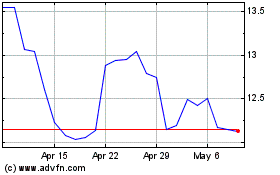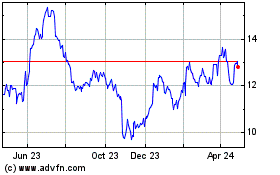By Christina Rogers And Anna Wilde Mathews
The United Auto Workers union is pushing Detroit car makers to
put all their employees under one health-care umbrella, creating a
powerful purchasing group that could upend traditional health care
markets.
The union's idea would create a joint purchasing group for the
three largest U.S. auto makers that would cover factory and
white-collar workers and union-affiliated retirees. The group could
total nearly 1 million members, a scale it believes would have
unprecedented leverage in negotiating directly with hospitals, drug
companies and others.
Assuming the idea even gets off the ground, it could take one to
two years to set up and longer to generate significant savings,
health-care experts said.
Ford Motor Co., Fiat Chrysler Automobiles NV and General Motors
Co. largely rely now on health insurers to negotiate deals with
hospitals, doctors and other medical providers for their workers'
and white-collar retirees' plans. A separate UAW-affiliated trust
fund manages health care expenses and benefits for about 750,000
hourly retirees and their dependents.
UAW President Dennis Williams previously has described the plan
as a way for auto makers to gain more control over health-care
expenses and win cost savings. He wants the purchasing group
overseen by a board of union and auto industry executives. A prior
effort to pull together employees of the three stalled in 2011
because auto makers weren't interested in pursuing it.
It is unclear how insurers like Blue Cross Blue Shield of
Michigan--which handles much of the Detroit auto makers' health
care business--would fit into this new model. Blue Cross Blue
Shield of Michigan declined to comment.
A Ford spokesman said even if it were to negotiate directly with
providers "we still need a benefits administrator" due to the
complexity of claims, suggesting a role for Blue Cross Blue Shield
would remain.
GM and Fiat Chrysler each said they would be open to discussing
ways to reduce the rising costs of employee medical care, but
declined to comment specifically on the idea.
The UAW declined to make Mr. Williams available for an
interview.
The union official is leading contract negotiations with the
auto makers on a new, four-year deal to replace a contract expiring
this month.
Analysts say the health-care proposal would be a way to free up
savings for a wage increase.
Detroit car companies spend more than $2 billion annually on
medical care for factory workers and dependents. Mr. Williams has
said the purchasing group could include the auto maker's 90,000
white collar workers and their dependents. The UAW-affiliated
health care trusts have a combined $61 billion in assets.
UAW members at the U.S. car makers typically pay between 6% and
8% of their medical costs, compared with the 28% of costs paid by
the average U.S. manufacturing worker, according to researcher
Truven Health Analytics.
Auto makers have said their employee health-care costs are
rising at an unsustainable rate and could creep higher with a
federal tax on benefit-rich plans beginning in 2018.
Union officials are reluctant to agree to shift more of the cost
burden to workers, according to people familiar with negotiations.
The union has a record of suggesting ways to maintain generous
medical benefits while offering cost-effective strategies to auto
makers.
In 2005, as the domestic auto makers lost market share and faced
rising costs for current and retired workers, then-UAW President
Ron Gettelfinger proposed setting up trusts known as voluntary
employee beneficiary associations, or VEBAs, to take billions of
dollars of retiree health-care costs off the car companies'
books.
That proposal was adopted in 2007 as financial losses mounted at
the auto makers, and the shift led to a significant decline in the
auto makers' annual labor costs.
Mr. Williams, a VEBA trusteesince 2012, has a keen view on how
the retiree plans has operated. Since they were established in
2010, the trusts have managed to expand benefits and restore full
vision and dental coverage for retirees while keeping annual
cost-growth in the low single digits, said industry experts.
Health spending growth in the U.S. has generally been muted in
recent years, running at around 4% annually, a slowdown that some
economists have attributed to the recession and its
after-effects.
Under his plan, Mr. Williams has said the car makers and the
retiree trusts would continue to fund their health benefits
separately. In addition to joint negotiating with health-care
providers, the group would look for ways to manage costs and
quality of care more efficiently.
One option for the purchasing pool, say people familiar with the
matter, would be for it to establish "centers of excellence," a
model in which employers contract with a few highly-rated medical
centers for better rates on procedures such as knee surgery.
Companies including Boeing Co., Wal-Mart Stores, Inc. and Lowe's
Cos. have such setups, which typically supplement traditional
health plans
Lowe's has a deal with the Cleveland Clinic and flies employees
to Ohio for heart surgeries at no cost to the worker.
The savings from direct deals between employers and health-care
providers can be substantial, with some arrangements producing
cost-reductions of between 10% and 20% compared with traditional
coverage plans, said Erin Tatar, national leader at Towers Watson
& Co.'s health management practice.
Employers often work with third parties to facilitate their
deals with health-care providers--including insurers that
administer traditional health benefits, as well as outside
operators like the Pacific Business Group on Health, a nonprofit
organization that represents employers.
Auto makers have considered other approaches to reducing medical
expenses, and will be looking for quantifiable, near-term savings
in ongoing contract talks. That could lead them to push for higher
out-of-pocket costs for hourly workers regardless of those
attempts.
The idea of employers striking deals directly with hospitals,
doctors and other medical providers has gained attention lately as
companies seek to trim costs and better control quality. More
hospitals are also eager to open direct relationship, some with
designs on launching their own health-insurance units.
Crafting direct contracts "is incredibly complex to execute,"
said Towers Watson's Ms. Tatar.
Write to Christina Rogers at christina.rogers@wsj.com and Anna
Wilde Mathews at anna.mathews@wsj.com
Subscribe to WSJ: http://online.wsj.com?mod=djnwires
(END) Dow Jones Newswires
September 02, 2015 19:44 ET (23:44 GMT)
Copyright (c) 2015 Dow Jones & Company, Inc.
Ford Motor (NYSE:F)
Historical Stock Chart
From Mar 2024 to Apr 2024

Ford Motor (NYSE:F)
Historical Stock Chart
From Apr 2023 to Apr 2024
